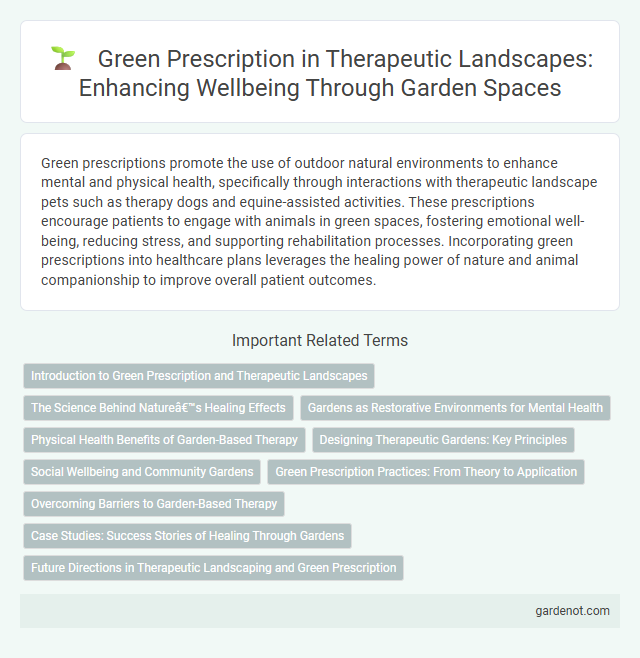Green prescriptions promote the use of outdoor natural environments to enhance mental and physical health, specifically through interactions with therapeutic landscape pets such as therapy dogs and equine-assisted activities. These prescriptions encourage patients to engage with animals in green spaces, fostering emotional well-being, reducing stress, and supporting rehabilitation processes. Incorporating green prescriptions into healthcare plans leverages the healing power of nature and animal companionship to improve overall patient outcomes.
Introduction to Green Prescription and Therapeutic Landscapes
Green Prescription programs encourage physical activity in natural settings to improve mental and physical health, harnessing the therapeutic benefits of outdoor environments. Therapeutic landscapes integrate natural elements like green spaces, parks, and gardens that promote healing, reduce stress, and enhance well-being. Research links exposure to these environments with lower cortisol levels, improved mood, and increased patient recovery rates.
The Science Behind Nature’s Healing Effects
Green prescription leverages scientific evidence highlighting nature's role in reducing stress hormones, lowering blood pressure, and enhancing immune function. Studies demonstrate exposure to green spaces promotes neurogenesis and improves mental health by increasing serotonin levels. The therapeutic landscape integrates biophilic design principles that optimize environmental benefits for physical and psychological healing.
Gardens as Restorative Environments for Mental Health
Gardens serve as restorative environments that significantly enhance mental health by reducing stress, anxiety, and depression through exposure to natural elements and calming landscapes. Green prescriptions incorporate garden therapy to promote psychological well-being, leveraging sensory stimulation, physical activity, and social interaction within therapeutic horticultural settings. Research shows that regular engagement with garden spaces supports cognitive function, emotional regulation, and overall resilience in individuals facing mental health challenges.
Physical Health Benefits of Garden-Based Therapy
Garden-based therapy, also known as green prescription, significantly enhances physical health by promoting regular physical activity such as gardening, which improves cardiovascular fitness and muscle strength. Exposure to natural environments reduces blood pressure, lowers cortisol levels, and supports immune system function, contributing to overall physiological well-being. Studies reveal that participants in garden-based programs experience decreased symptoms of chronic conditions like hypertension, diabetes, and arthritis, demonstrating its therapeutic potential.
Designing Therapeutic Gardens: Key Principles
Designing therapeutic gardens centers on principles such as accessibility, sensory engagement, and restorative environments to enhance mental and physical well-being. Incorporating diverse plant species, water features, and varied textures promotes relaxation and stimulates the senses, aiding in stress reduction and cognitive restoration. Prioritizing user-centered design ensures spaces cater to diverse populations, including those with mobility challenges, fostering inclusive healing experiences.
Social Wellbeing and Community Gardens
Green prescriptions encourage participation in community gardens, fostering social wellbeing through increased face-to-face interactions and shared responsibilities. These therapeutic landscapes provide a sense of belonging, reduce feelings of isolation, and enhance mental health by connecting individuals with nature and their neighbors. Research shows community gardening boosts social cohesion and promotes resilience among diverse populations.
Green Prescription Practices: From Theory to Application
Green prescription practices integrate evidence-based therapeutic landscape concepts to promote physical activity, mental well-being, and social connection through nature exposure. Healthcare providers recommend personalized outdoor activities such as walking in parks, gardening, or forest bathing to leverage natural environments for chronic disease management and stress reduction. Effective implementation relies on interdisciplinary collaboration, patient education, and monitoring to maximize health outcomes and sustainability.
Overcoming Barriers to Garden-Based Therapy
Green prescriptions in therapeutic landscapes emphasize overcoming barriers to garden-based therapy by addressing accessibility issues, such as physical limitations and lack of transportation. Implementing adaptive gardening tools and community support networks enhances patient engagement and ensures sustained participation. Tailoring garden environments to accommodate diverse needs fosters inclusivity and maximizes therapeutic outcomes.
Case Studies: Success Stories of Healing Through Gardens
Green prescription programs demonstrate significant health benefits by prescribing time in therapeutic gardens for patients with chronic illnesses. Case studies from institutions like the UK's National Health Service reveal marked improvements in mental health, reduced anxiety, and faster recovery rates among participants. These success stories highlight gardens as effective adjuncts to conventional treatment, promoting holistic healing through nature engagement.
Future Directions in Therapeutic Landscaping and Green Prescription
Future directions in therapeutic landscaping emphasize integrating green prescriptions into personalized healthcare plans to enhance mental and physical well-being. Advanced GIS mapping and sensor technology enable precise design of therapeutic landscapes tailored to individual patient needs. Expanding interdisciplinary research bridges urban planning, environmental psychology, and public health to optimize green spaces as cost-effective, evidence-based treatments.
Green prescription Infographic

 gardenot.com
gardenot.com